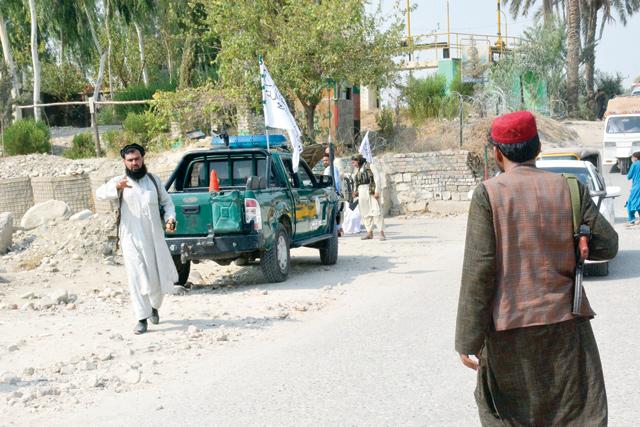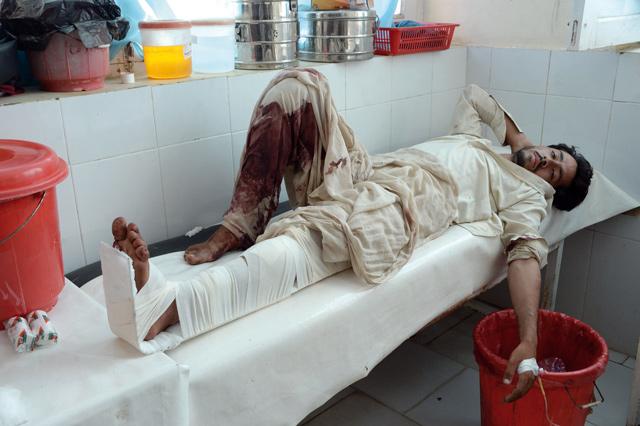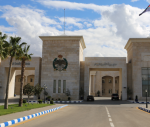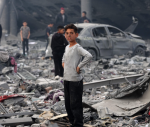You are here
Three blasts kill at least two in Afghanistan's Jalalabad
By AFP - Sep 18,2021 - Last updated at Sep 18,2021

Taliban members inspect near the site of a blast in Jalalabad on Saturday (AFP photo)
KABUL — Two people were killed when three blasts struck the Afghan city of Jalalabad on Saturday, at least one of which targeted a Taliban vehicle, in the country's first deadly attack since the United States withdrew.
The hardline Islamist group stormed to power in mid-August, ousting the government and promising to restore security to the violence-wracked country.
"In one attack a Taliban vehicle patrolling in Jalalabad was targeted," a Taliban official who asked not to be named told AFP.
"Women and children were among the injured," he added.
An official from the health department of Nangarhar Province told AFP that three people died and 18 were wounded, while several local media reported the attacks left at least two dead.
Photos taken at the site of the blast showed a green pick-up truck with a white Taliban flag surrounded by debris as armed fighters looked on.
Jalalabad is the capital of Nangarhar, the heartland of the Daesh terror group’s Afghanistan branch.
A chaotic US-led evacuation of foreigners and Afghans who worked for international forces was marred by a devastating bomb attack claimed by Daesh which killed scores of people.
But since the last American troop left on August 30, the violence-wracked country plagued by fighting, bombs and air strikes, has been free of major incidents.
Although both Daesh and the Taliban are hardline Islamist militants, they have differed on the minutiae of religion and strategy.
That tussle has led to bloody fighting between the two.
Boys back to school, not girls
Saturday’s bombing came as the Taliban ordered boys and male teachers to return to secondary school in Afghanistan — but girls were excluded.
“All male teachers and students should attend their educational institutions,” a statement said ahead of classes resuming on Saturday, the first day of the week in Afghanistan.
The statement, issued late Friday, made no mention of women teachers or girl pupils.
“We lack teachers, most of them are females and are not allowed to come by the new government, that creates a problem for us,” an official at a Kabul secondary school who asked not to be named told AFP on Saturday.
Secondary schools, with students typically between the ages of 13 and 18, are often segregated by sex. During the COVID-19 pandemic, they have faced repeated closures and have been shut since the Taliban seized power.
Since a US-led invasion ousted the Taliban in 2001, significant progress has been made in girls’ education, with the number of schools tripling and female literacy nearly doubling to 30 per cent — however, the change was largely limited to the cities.
The United Nations said it was “deeply worried” for the future of girls’ schooling in Afghanistan.
“It is critical that all girls, including older girls, are able to resume their education without any further delays. For that, we need female teachers to resume teaching,” the UN’s children’s agency UNICEF said.
Pakistan pushes for inclusive gov’t
In a further sign that the Taliban’s approach to women and girls had not softened, a sign outside the ministry of women’s affairs was replaced with another, announcing the return of the feared department for the Promotion of Virtue and Prevention of Vice.
Videos posted to social media showed women workers from the ministry protesting outside after losing their jobs.
No official from the Taliban responded to requests for comment.
After promising a more inclusive rule, the movement unveiled an all-male government of mostly ethnic Pashtuns, dominated by veteran members of the fundamentalist movement.
Pakistan’s Prime Minister Imran Khan on Saturday said he had launched talks with the Taliban to persuade the group to form a government that includes Tajiks, Hazaras and Uzbeks.
‘Tragic mistake’
Meanwhile, a top United States general admitted it had made a “mistake” when it launched a drone strike against suspected Daesh militants in Kabul last month, instead killing 10 civilians, including children.
The strike during the final days of the US pullout was meant to target a suspected Daesh operation that US intelligence believed with “reasonable certainty” was planning to attack Kabul airport, said US Central Command Commander Gen. Kenneth McKenzie.
“The strike was a tragic mistake,” McKenzie told reporters after an investigation.
McKenzie said the government was looking into how payments for damages could be made to the families of those killed.
“I offer my deepest condolences to surviving family members of those who were killed,” US Defence Secretary Lloyd Austin said in a statement.
The UN Security Council voted on Friday to extend the UN political mission in Afghanistan for six months, with a focus on development issues but not peacekeeping.
Related Articles
KABUL — A suicide bomber in Afghanistan killed at least 32 people and wounded more than 120 at a demonstration on Tuesday on the highway bet
KABUL — Dozens of young girls were buried on Sunday at a desolate hilltop cemetery in Kabul, a day after a secondary school was target
KABUL — The leader of the Daesh terror group in Afghanistan was killed by air strikes over the weekend along with 10 other people, governmen

















